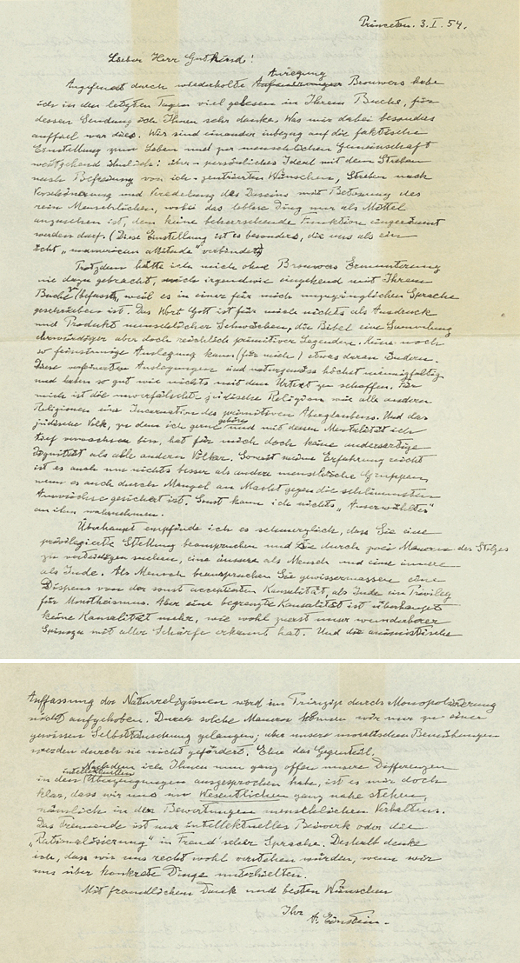
With dependable frequency, the religious views of Albert Einstein get revised and re-revised according to some re-discovered or re-interpreted quotation from his scientific work or personal correspondence. It’s not especially surprising that Einstein had a few things to say on the subject. As the pre-eminent theoretical physicist of his age, he spent his days pondering the mysteries of the universe. As one of the most famous public intellectuals in history, and an immigrant to a country as highly religious as the United States, Einstein was often called on to voice his religious opinions. Like any one of us over the course of a lifetime, those statements do not harmonize into a neat and tidy confession of belief, or unbelief. Instead, at times, Einstein explicitly aligns himself with the pantheism of Baruch Spinoza; at other times, he expresses a much more skeptical attitude. Often he seems to stand in awe of a vague deist notion of God; Often, he seems maximally agnostic.
Einstein rejected the atheist label, it’s true. At no point in his adult life, however, did he express anything at all like a belief in traditional religion. On the contrary, he made a particular point of distancing himself from the theologies of Judaism and Christianity especially. Though he did admit to a brief period of “deep religiousness” as a child, this phase, he wrote “reached an abrupt end at the age of twelve.” As he writes in his Autobiographical Notes, after a “fanatic orgy of freethinking,” brought on by his exposure to scientific literature, he developed a “mistrust of every kind of authority… a skeptical attitude toward the convictions that were alive in any specific social environment—an attitude that has never left me, even though, later on, it has been tempered by a better insight into the causal connections.” In contrast to the “religious paradise” of his youth, Einstein wrote that he had come to find another kind of faith—in the “huge world… out yonder… which stands before us like a great riddle.”
Einstein’s rejection of a personal God was undeniably final, such that in 1954, a year before his death, he would write the letter above to philosopher Erik Gutkind after reading Gutkind’s book Choose Life: The Biblical Call to Revolt on the recommendation of a mutual friend. The book, Einstein tells its author, is “written in a language inaccessible to me.” He goes on to disparage all religion as “the most childish superstition”:
The word God is for me nothing more than the expression and product of human weakness, the Bible a collection of honorable, but still purely primitive, legends which are nevertheless pretty childish. No interpretation, no matter how subtle, can change this for me. For me the Jewish religion like all other religions is an incarnation of the most childish superstition. And the Jewish people to whom I gladly belong, and whose thinking I have a deep affinity for, have no different quality for me than all other people. As far as my experience goes, they are also no better than other human groups, although they are protected from the worst cancers by a lack of power…
You can read a full transcript at Letters of Note, who include the letter in their second volume of fascinating correspondence from famous figures, More Letters of Note. The letter went up for auction in May of 2008, and a much more dogmatically anti-religious scientist had a keen interest in acquiring it: “Unsurprisingly,” Letters of Note point out, “one of the unsuccessful bidders was Richard Dawkins.”
Related Content:
“Do Scientists Pray?”: A Young Girl Asks Albert Einstein in 1936. Einstein Then Responds
Albert Einstein Reads ‘The Common Language of Science’ (1941)
Einstein for the Masses: Yale Presents a Primer on the Great Physicist’s Thinking
50 Famous Academics & Scientists Talk About God
Josh Jones is a writer and musician based in Durham, NC. Follow him at @jdmagness


Fortunately or unfortunately, Jews are no longer “protected from the worst cancers by a lack of power”.
“dogmatically anti-religious”?
Not sure the word “dogmatically” is what you are looking for. Maybe “passionately”?
Permanentemente, desde los cenáculos religiosos se realizan desesperados intentos por engatusar a las gentes, haciéndoles creer que Einstein era religioso-teísta. Creen así, burlar la verdad, pasando por encima de la ciencia intentando mostrar a uno de los mayores científicos y mentes humanas como ganado para su causa. Fracasan y se terminan frustrando como cuando a toda costa intentan probar de cualquier manera la existencia de un dios. Terminan embaucando a algunos incautos dóciles, pero la civilización humana, cada vez más va adquiriendo un mayor número de personas instruidas y las muy opresoras religiones van en retirada en todo el mundo.El Geniol de las religiones ya no alcanza y sus rostros de supuesta bondad y sinceridad ya no convencen. Los “rebaños” ya no quieren ser tales. El humo de las religiones se está empezando a disipar.
Atheists can be dogmatic. I’d put Dawkins up as a prime example. Not sure that Einstein could be considered as such, but the phrase “dogmatically anti-religious” is a valid one when describing certain people.
if one does not ascribe to it, why talk about it so much. I am a comfortable atheist who has no need to discuss it at length because I have no need for others to concur. I can’t believe I even read further. I guess it was because Einstein was mentioned, and he is somewhat interesting to me.